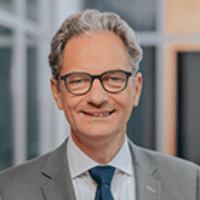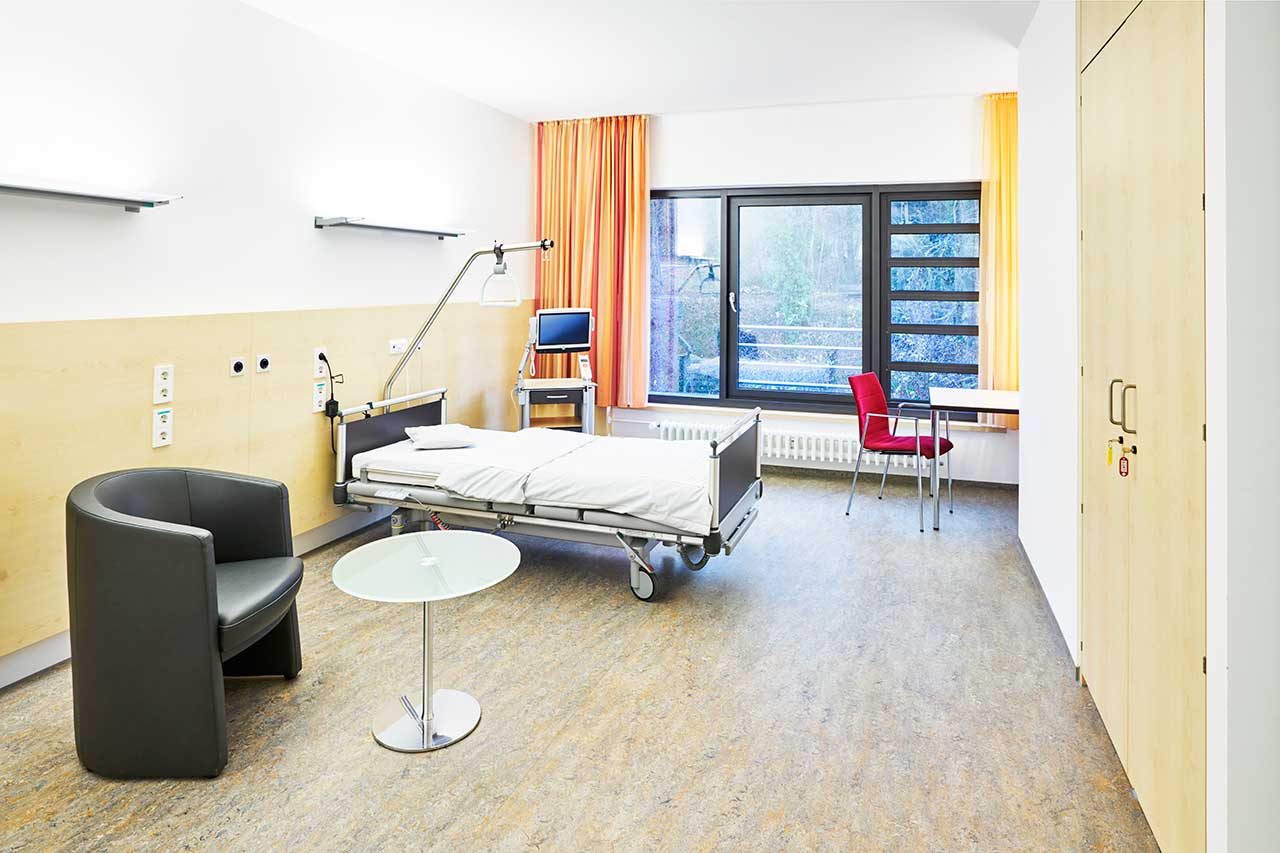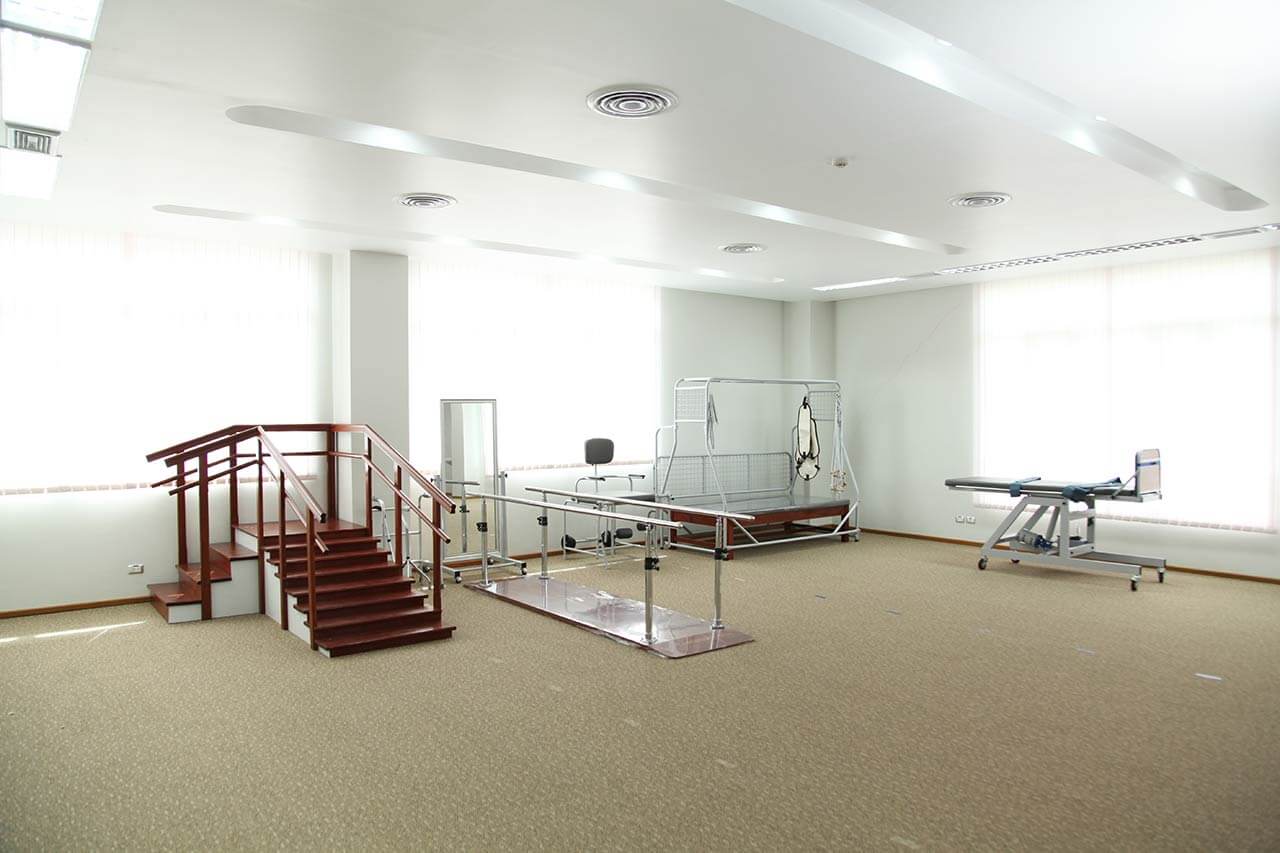
The program includes:
- Primary presentation in the clinic
- medical history, including family history
- complex neurological and orthopedic examinations
- CT / MRI / X-ray examination
- complex neurophysiological examinations
- consultation and curating by a neurourologist
- individual rehabilitation program, which includes:
- bladder training
- bowel training
- propriozeptive neuromuskuläre fazilitation (PNF)
- transcranial magnetic stimulation (TNS)
- orofacial stimulation of Castillo Morales
- functional propriotrening
- various methods of respiratory gymnastics
- Wii Fit training in the use of the balance
- neuropsychological therapy
- functional therapy of the upper extremities (ArmeoSpring)
- functional electrical stimulation / neurostimulation
- kinesitherapy (physiotherapy)
- biocontrol with feedback
- healing deep muscle massage
- neuromuscular electrostimulation
- acupuncture of spasticity and pain syndromes
- occupational therapy
- psycho-educational classes
- Individual physiotherapy
- microcurrent treatment
- fangotherapy / cryotherapy
- antispasmodic drug therapy (incl. Botox)
- mobilization of limb joints
- hydrotherapy / massage therapy / reflexology
- training on special trainers (Lokomat, exoskeleton)
- and etc.
- day-and-night care nurses
- stay in the hospital with full board
- symptomatic and drug therapy
day-and-night |
Service
You may also book:
 BookingHealth Price from:
BookingHealth Price from:
About the department
The Department of Neurological Rehabilitation at the MEDIAN Neurological Rehabilitation Clinic Magdeburg provides high-quality rehabilitation treatment for patients after a neurological disorder or a neurosurgical intervention. Of particular interest is the rehabilitation of patients after stroke, traumatic brain injuries, spinal injuries, multiple sclerosis, Parkinson's disease, neurodegenerative diseases and other neuropathologies. The team of the department's rehabilitation therapists specializes in the neurological rehabilitation of phases B, C, D and E. With appropriate clinical indications, neurological rehabilitation can be provided on an outpatient basis. The set of rehabilitation measures is selected for each patient individually, depending on his neurological status and rehabilitation potential. Young patients are offered effective medical profession-oriented rehabilitation to restore their work capacity. The Chief Physician of the department is Prof. Dr. med. Michael Sailer.
The first and the most important stage of the patient's treatment is comprehensive diagnostics, which helps the department's specialists assess the general health of the patient and the degree of damage to the functions of the nervous system. The diagnostics may involve such examinations as electroencephalography, recording of somatosensory, auditory and visual evoked potentials, electromyography, electroneurography, Doppler ultrasonography of the peripheral vessels, radiography, abdominal ultrasound, echocardiography and many others. The doctors also accurately study the patient's medical history. Based on all the diagnostic data, the specialists elaborate an individual rehabilitation program with particular goals, which must be achieved after the rehabilitation treatment completion. The primary goal of each rehabilitation program is to maximally restore the patient's ability to self-care and reintegrate him into his usual life. To restore motor and cognitive skills, the rehabilitation therapists competently select the necessary rehabilitation measures and their optimal intensity. The decisive role is also played by the regularity of certain therapeutic procedures.
In most cases, the department's rehabilitation therapists use such effective types of rehabilitation methods as therapeutic exercises, physiotherapy, sports therapy, massage, speech therapy, mirror therapy, neuropsychological care, drug therapy, diet therapy, including the formation of proper eating habits in patients during practical classes in the training kitchen. Each type of therapy is provided by a highly-specialized expert in this area (for example, in the field of physiotherapy, speech therapy, etc.) who personally supervises each patient, monitors his progress and, if necessary, reduces or increases the intensity of training. Some types of rehabilitation treatment are provided in groups, but always under medical supervision. Special attention should also be given to the high-quality nursing care provided by the specially trained highly qualified employees. In addition, the department's medical team is convinced that a friendly attitude towards patients motivates them and creates a positive mindset on the success of rehabilitation. The doctors also promote the involvement of patients' relatives, who provide them with great support during such a difficult time.
It is worth noting that the department has an innovative Intensive Care Unit for phase B early rehabilitation. It admits patients after emergency care, who require mechanical ventilation, patients with apallic syndrome, tracheostomy and paraplegia. The department's Intensive Care Unit meets the current requirements of modern medicine.
The department specializes in rehabilitation of patients with the following neurological diseases:
- Stroke (ischemic stroke and cerebral hemorrhage)
- Traumatic brain injuries
- Spinal cord injuries
- Meningitis and encephalitis
- Multiple sclerosis
- Parkinson's disease
- Neuritis and radiculopathies
- Muscle diseases
- Neurodegenerative diseases
- Epilepsy
- Migraine
- Neurogenic swallowing disorders
- Aphasia, dysarthria
- Neurocognitive disorders
- Congenital diseases and malformations of the nervous system
- Cerebral hypoxia (for example, after intensive care or due to trauma)
- Neurological disorders, which require intensive care or mechanical ventilation
- Conditions after surgery on extra- and intracranial vessels supplying the brain
- Conditions after surgery to remove large brain and spinal cord tumors
- Other neurological disorders and pathological conditions
The range of the department's diagnostic and therapeutic services includes:
- Diagnostic tests
- Electroencephalography (EEG)
- Recording of somatosensory, auditory and visual evoked potentials
- Electromyography
- Electroneurography
- Extra- and transcranial sonography
- Doppler ultrasonography of the peripheral vessels
- Echocardiography (transthoracic and transesophageal)
- Pulmonary function testing
- Abdominal ultrasound
- 24-hour blood pressure monitoring
- X-ray diagnostics
- Swallowing assessment
- Endoscopic examinations of the gastrointestinal tract
- Clinical laboratory tests
- Neuropsychological laboratory tests and computer methods for the assessment of the patient's neuropsychological state
- Computed tomography (CT)
- Magnetic resonance imaging (MRI)
- Rehabilitation methods
- Physiotherapy
- Massage
- Lymphatic drainage
- Hydrotherapy
- Electrotherapy
- Electrostimulation
- Thermotherapy
- Cryotherapy
- Respiratory therapy
- Therapeutic exercises, including exercises in the pool, on an ergometer, a treadmill, use of the professional equipment for training balance, walking, etc.
- Sports therapy
- Water aerobics, Nordic walking, Tai-Chi (in groups)
- Medical training therapy
- Ergotherapy
- Speech therapy for the treatment of dysarthria and aphasia, as well as for the elimination of swallowing disorders
- Neuropsychological care
- Special care program for patients with apallic syndrome
- Interdisciplinary treatment of spasticity
- Drug therapy
- Formation of proper dietary habits in patients during practical classes in the training kitchen
- Medical profession-oriented rehabilitation to restore the work capacity
- Physiotherapy
- Other medical services
Curriculum vitae
Higher Education and Professional Career
- Since 2007 Chief Physician of the Department of Neurological Rehabilitation at the MEDIAN Neurological Rehabilitation Clinic Magdeburg.
- 2006 Endowed Professorship, Otto von Guericke University Magdeburg.
- 2004 Master of Business Administration.
- 1998 Senior Physician with management responsibilities, Department of Neurology, Hospital at the Otto von Guericke University Magdeburg.
- 1995 Senior Physician, Department of Neurology, Hospital at the Otto von Guericke University Magdeburg.
- 1990 - 1994 Professional training in Neurology, Department of Neurology at the Hannover Medical School.
- 1998 - 1990 Assistant at the Institute of Pathology at the Hannover Medical School.
Memberships in Professional Societies
- Board Member of the German Society of Neurorehabilitation (DGNR).
- Board Member of the Federal Association for Medical Profession-Oriented Rehabilitation.
- Head of the Medical Advisory Board of the State of Saxony-Anhalt of the German Multiple Sclerosis Society.
- Representative of the Medical Board for Neurologic Rehabilitation of the Median Kliniken Group.
Photo of the doctor: (c) MEDIAN Klinik NRZ Magdeburg
About hospital
The MEDIAN Neurological Rehabilitation Clinic Magdeburg enjoys a reputation of one of the best highly specialized centers in Germany for the medical rehabilitation of patients after diseases of the nervous system and neurosurgical interventions. The clinic opened its doors to the first patient in 1999, and since that time has confidently held leading positions in the European medical arena. The medical facility has 210 beds for inpatient treatment. A highly professional interdisciplinary team of rehabilitation therapists provide neurological rehabilitation of phases B, C, D and E, while using both reliable classical treatments and the very latest advances in the field of medical rehabilitation. The specialists of the medical facility most often admit patients with such diseases as stroke, traumatic brain injuries, meningitis and encephalitis, spinal cord injuries, multiple sclerosis, Parkinson's disease, neurodegenerative diseases, epilepsy and many others.
The clinic has an excellent infrastructure, including diagnostic rooms with advanced equipment and treatment rooms, in which patients undergo various types of medical rehabilitation: therapeutic exercises, physiotherapy, occupational therapy, speech restoration, medical profession-oriented rehabilitation, etc. The specialists of the medical facility are convinced that the best results of rehabilitation can be achieved only by elaborating an individual rehabilitation program for each patient with particular goals based on a comprehensive assessment of his neurological status and rehabilitation potential. The main task of the medical team of the clinic is the maximum restoration of the lost skills and the patient's ability to self-care, as well as his reintegration into professional life. The long clinical experience of the specialists working in the rehabilitation center allows them to select a unique set of rehabilitation measures for each patient, after passing which he will be able to live a full life again. Depending on the complexity of the clinical case, the neurological rehabilitation can be provided both on an inpatient and outpatient basis.
In addition, the doctors of the clinic make every effort to create a pleasant and warm atmosphere in the rehabilitation center, in which the patient will feel comfortable. The smile and friendly attitude of the medical staff motivate patients to achieve optimal results. The clinic encourages the involvement of relatives and close people of the patient in the therapeutic process.
The quality of medical services provided in the rehabilitation clinic is awarded with many prestigious certificates, such as ISO certificate, TÜV Rheinland certificate, DEGEMED certificate of the German Society for Medical Rehabilitation, BAR certificate and others. It should be noted that the clinic is also a recognized Multiple Sclerosis Rehabilitation Center (certified by the German Multiple Sclerosis Society), as well as the Center of Excellence for Aphasia in Saxony-Anhalt and the Center for Swallowing Disorders.
Photo: (с) depositphotos
Accommodation in hospital
Patients rooms
The patients of the MEDIAN Neurological Rehabilitation Clinic Magdeburg live in comfortable single and double rooms with a modern design. Each patient room has an ensuite bathroom with shower and toilet. Many patient rooms are specially equipped in order to meet the needs of disabled people. The standard patient room furnishings include an automatically adjustable bed, a bedside table, a wardrobe, a table and a chair for receiving visitors, a telephone and a TV. The patient rooms also have Wi-Fi.
If desired, the patients can live in enhanced-comfort rooms. They are additionally equipped with upholstered furniture, a mini fridge and a safe for storing valuables.
Meals and Menus
The patient and the accompanying person are offered tasty and balanced three meals a day. The patients have a daily choice of three menus for lunch, as well as buffet breakfast and dinner. If for some reason you do not eat all foods, you will be offered an individual menu. Please inform the medical staff about your food preferences prior to treatment.
Further details
Standard rooms include:
Religion
The religious services are available upon request.
Accompanying person
During the inpatient program, the accompanying person can live with the patient in a patient room or a hotel of his choice. Our managers will help you choose the most suitable option.
Hotel
During an outpatient program, the patient can stay at the hotel of his choice. Our managers will help you choose the most suitable option.




